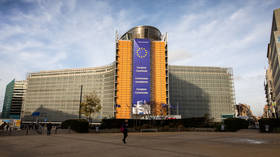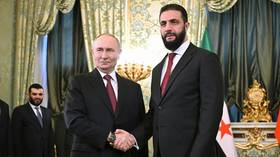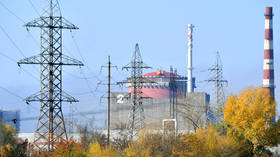The bloc’s leaders have been pressuring Belgium for months to allow it to seize Russian sovereign funds
EU leaders are considering a long-developed and highly controversial plan to use Russian sovereign funds frozen in Belgium to finance Ukraine’s conflict with Russia.
Up to now the EU has given Kiev about €180 billion ($208 billion). Reconstruction costs at present are estimated at approximately €480 billion ($556 billion). Ukraine’s economy is crumbling and it has just announced a record war budget.
What’s the scheme? The EU is proposing to “borrow” Russia’s money (reportedly some €160 billion) from Euroclear, a privately owned company in Belgium, with all member states promising to pay it back when, as they put it, Ukraine wins the war and Russia agrees to pay reparations.
Isn’t that wishful thinking? The “reparations loan” idea assumes Ukraine will win the war and Russia will agree to pay reparations. Neither of those is likely.
How would it work out then?
The EU could then forgive Kiev’s debt – but it would still have to repay the money it borrowed from Euroclear.
Who would ultimately pay? Probably European taxpayers – not a politically popular or sustainable idea in a bloc where the far-right is surging electorally and Brussels forces through an agenda on militarization.
And what about the bankers? European central bankers fear a legal precedent that could undermine global financial stability – as well as destroying the euro’s reputation as a safe space.
OK, so the EU wants to take and use Russian money held privately in Belgium. Who has said what?
Belgian Prime Minister Bart De Wever, whose country hosts Euroclear, where most EU-held Russian assets sit, has warned that “ there ’s no free money. There are always consequences.” “ I want their signature saying, if we take [Russian President Vladimir] Putin ’s money… we ’re all going to be responsible if it goes wrong.” Luxembourg’s prime minister, Luc Frieden, voiced similar apprehensions.“From my vantage point, and with in mind financial stability and the strength of the euro, we will be looking very attentively to make sure that what is proposed is in accordance with international law (and) is mindful of financial stability,” Lagarde said . warned the bloc’s leaders to respect international law.
How divided is the EU? France wants the money to be spent on European weapons and generally financing the Ukrainian state. Germany wants the money to be spent on weapons only. Other EU members think Kiev should decide how to spend the money.
Has Kiev got a say? Kiev itself insists there be no restrictions on how the money would be spent – a stance widely regarded with skepticism in the EU given the risk of cash being siphoned off into Ukraine’s notorious graft channels.
What does Russia think and what has it warned of? Russia is thought to hold some €200 billion in EU funds – most of which is privately owned.“smarter” governments oppose the seizure of Russian assets as“they understand that it would fundamentally undermine all principles of international economic activity and, without a doubt, cause enormous harm to the... international financial system.”
Kremlin spokesman Dmitry Peskov has warned of a “boomerang” if Russian assets are tapped to finance Kiev, telling reporters earlier this month that “these plans are all about the illegal seizure of Russian property. We are talking about theft,” Peskov told reporters on Wednesday. “ If someone wants to steal our property, our assets, and illegally appropriate them... they will be subjected to legal prosecution in one way or another.” “These are all steps towards the complete destruction of trust in the principle of property inviolability. The boomerang will hit countries which host the main depositories and are interested in investment attractiveness very hard,” he warned.“ This all looks like a gang: someone keeps lookout, someone robs, and someone, like Belgium, shouts, ‘ Guys, let ’s share responsibility.”
What's the bottom line?
If the EU engages in what Russia sees as “theft,” we could see a euro slump while Kiev prepares for a much longer war.
You can share this story on social media:
Follow RT on 











